
If you have a smart struggling child, you may be asking yourself, “Should we invest in a summer program for our child?” Our specialty is the student who is a lot smarter than present results would indicate and is what we call a bright right brain learner – who learns best when they see and experience information.
The simple answer is yes, if:
- Your child is a lot smarter than present results would indicate?
- You have the time and resources to do the right program.
- You find the right program that can help your child to make significant gains in months in multiple areas (e.g. reading fluency, reading comprehension, attention, confidence …)
- You get the help needed to be the coach and advocate your child needs
Is 3D Learner The Right Summer Program for Your Child?
If you have a smart struggling child, they may have been identified with dyslexia, ADHD, executive function or related challenges. We have found that most smart struggling students:
- Are a bright right brain learner
- Often have a sea of strengths and challenges
- Can do far better when one focuses on their strengths, while addressing their challenges
- Can benefit from the right summer program, when school pressure is not present
As we look back over the last 27 years, we notice that a significant number of students we helped over the summer made significant gains in their reading fluency, reading comprehension, math skills, attention and self-confidence.
What were the key actions that led to our student’s success:
– Their parents called us and had a conversation.
– Their parents then invested in our Comprehensive Assessment that in each case showed their child learned differently, had significant strengths and challenges, and had the potential to do far better with what we offered.
– We discussed how what we offered could be far more effective than virtually any other program because:
-
- We teach the way their child learns
- We tailor our program to meet each child’s needs
- We engage our students by both focusing on what is important to them and by using our hands-on methods, that are integrated, engaging and effective
- We address the relevant attention, visual processing working memory and/or processing speed issues that are often present as well as address phonemic awareness
- Our approach improves decoding, reading fluency, and reading comprehension. We strive to ignite a love for learning and reading!
- While we help students with dyslexia, ADHD, executive function and related issues, we use the positive label of a Bright Right Brain Learner.
- We help parents to be the coach and advocate their child needs. NOTE: we offer one of the few programs that has parent coaching as an integral part of the program.
– The parents recognized that we could tailor a program to meet their child’s needs, help them to be the coach and advocate their child needed, and had a high probability of generating significant results within months.
– Their parents chose to work with us
What did our most successful parents do that led to truly outstanding progress? They
- Leveraged our intensive program that laid the groundwork for significant gains – note, in the last few years as we leverage zoom, we have been able to help students via zoom, too.
- Did the follow-up over the next few months to generate the maximum benefit from our joint efforts
Their child then made gains like the three cases outlined below:
One mom of a third grader was really frustrated. Despite investing in other programs, her bright 3rd grader was really struggling. 5 minutes into the initial call, she commented, “How is it that after 5 minutes you appear to know my child better than people who have known him for years”. She had been told to find another private school for her son, whose reading comprehension was 2 years below grade level,
She lived out of state and asked, “What is the best way to do your program”. We responded that while we offer a 5-day intensive program, we have seen excellent results with students who came for 3 days (for 2 to 4 hours, depending on the age of the student) and then another 2 days 4 to 6 weeks later. That is what she chose to do. Her son was able to improve his reading comprehension 3 grade levels over the next year, to excel at his school.
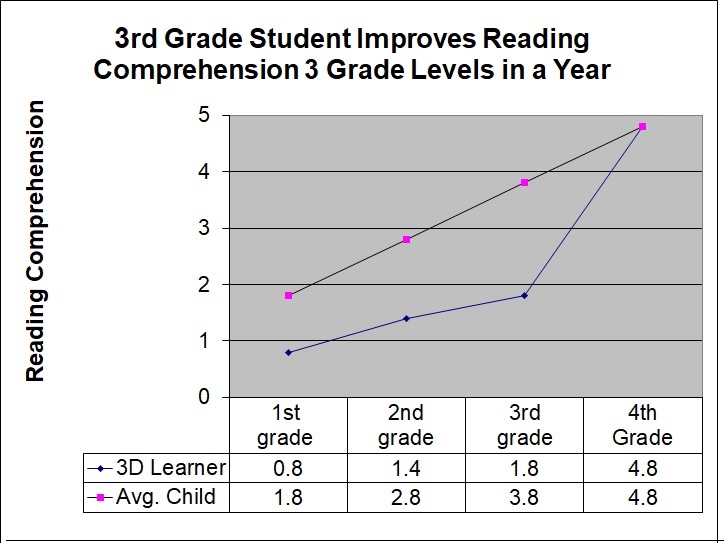
His teacher said “I have never seen a student make such dramatic gains in 27 years of teaching
For students who have come to us from California, Washington, Arizona and other states that are further away, a one-week intensive program is often more practical.
A rising 6th grader was really struggling with attention, self-control and reading comprehension. He was also struggling with baseball where his average had dropped to 260, as the pitching became harder to hit. As we spoke with him, we discussed how our program could help his baseball skills, as well as his attention, self-control and reading comprehension. Sports, dance, or martial arts are often what our students want to improve. By working on their neural timing and their visual processing, we are often able to engage the students and help them to dramatically improve their performance in sports and other activities.
With our help, he was able to:
- Improve his reading comprehension 4 grade levels in 5 months
- Double his reading speed
- Go from special education classes to regular education classes
- Be far more attention and control his impulses
- Increase his batting average from 260 to 382 and increase his home run production from 1 to 10
- Become much more confident in his abilities
A rising 9th grader who was a C+ student, his reading comprehension was 4 years below grade level, he was reading at 200 words per minute and was considered unmotivated. In our initial conversation, mom was delighted to hear that we would leverage her child’s strengths. With our work with the student and his parents he was able to:
- Improve his reading comprehension 4 grade levels in 100 days – from the 5th to 9th grade level
- Increase his reading speed from 200 to 360 words per minute
- Become a highly motivated student
- Excel in high school and get several full scholarship offers for college
Our program was developed to do this for our high school daughter. We realize our goal is to both motivate, train and support our students. We get student buy-in before we accept teenage students.

Both the Florida Empowerment Scholarship (FES- UA) and the Personalized Education Program vouchers are designed to help private school and homeschool students.
Private school parents can often use the vouchers towards tuition or to improve their child’s academic skills.
Homeschool parents often use the vouchers to improve their child’s academic performance.
Note, many private schools and homeschool students are what we call neurodivergent right brain learners.
At 3D Learner, we help the neurodivergent right brain learner to improve their academic, executive function and related skills.
We define neurodivergent right brain learners as students who:
- Learn differently – sometimes called neurodivergent, visual, kinesthetic or right brain learners. These students learn best when they see and experience information.
- May have dyslexia, dyscalculia or a learning disability,
- May have ADHD.
- May be on the autism spectrum – especially intelligent students with Aspergers.
- Are often smart enough to succeed but lack some key skills.
In this blog post we will discuss three other ways to leverage both the Florida Empowerment Scholarship (FES- UA) and the Personalized Education Program vouchers.
1- Some homeschool parents want their child to enter private or public schools in the fall. The challenge is their child may be struggling with reading comprehension, math, attention, executive function and/or anxiety challenges. 3D Learner addresses all these issues and more. The May – August time frame is an excellent time to close the gap.
2- A few parents realize their child is too far behind and use the Florida Empowerment Scholarship (FES- UA) and the Personalized Education Program vouchers to close significant gaps utilizing a gap year. This has helped three students to make much more significant gains this year, than they would have made with traditional schooling.
3- Some states offer significant scholarships for students who meet the GPA (Grade Point Average) or SAT – ACT requirements. The Florida Empowerment Scholarship (FES- UA) and the Personalized Education Program vouchers can be used to significantly improve SAT – ACT scores. This allows students to both earn a scholarship that may be worth $20,000 to $29,000 over four years and to get into better colleges or universities. You can read more about this on our blog post in the Bright Futures Scholarship.
If you would like to discuss how we might help your neurotypical, neurodivergent and right brain learners leveraging the Florida Empowerment Scholarship or Personalized Education Program vouchers, call 3D Learner at 561-361-7495 or book a time on our schedule at Let’s discuss the Florida Empowerment Scholarship – Unique Abilities or Personalized Education Program vouchers.
.

3D Learner offers a tailored, integrated, engaging and effective option that has helped thousands of neurodivergent, right brain and kinesthetic learners from 46 states and 13 other countries.
As Dr. Linda Silverman, the Director of the Gifted Development Center in Denver Colorado said,
”Your program is what many gifted students who learn differently need. I recommend many of the components you use, but you are the first professionals who have so effectively integrated them with your very unique and effective learning system.”
Many smart struggling students get identified with dyslexia, a learning disability, ADHD, and/or Executive Function challenges.
What is often missed is that a large number of these students are neurodivergent, right brain or kinesthetic learners. These students have a sea of strengths and challenges that may include:
- A neurodivergent, right brain or kinesthetic learner who learns best when they see and experience information
- Struggling with phonics, phonemic awareness and/or reading fluency – -may be dyslexia
- Able to focus on that which is interesting and have difficulty paying attention to that which is boring – they may or may not have ADHD.
- Able to remember what they see and experience and have a working memory challenge for what they hear or read
- Slow processors. Processing speed is often a problem that hampers their standardized test scores and frustrated parents and teachers, who expect your child to respond quicker
- Anxiety and frustration
- Suffering from intervention fatigue. They need something different
We recognize that our parents live in many different places and want a program that will work for both their child and them. In this blog post, we share:
3D Learner Options
3D Learner offers parents several unique options including:
- Coming for a one-week intensive program followed up with 10 hours via zoom. We have had students come from California, New York, Texas and many other states — as well as hosting students from 13 other countries.
- For students who live closer, but not close to our office (e.g. elsewhere in Florida, Maryland, New Jersey), students have come for 3 days of intensive training, followed up with 2 days of intensive training 4 to 8 weeks later. We then can do the appropriate follow-up via zoom.
- We have traveled to other places to do training for multiple clients – with Singapore being the place we traveled the furthest.
- We have also helped students solely via zoom – -which works well for some students – although we do prefer a live option. Note, for the very busy parents where travel is not an option, our program may be far better than local options.
If you have a neurodivergent, right brain or kinesthetic learner and want to discuss the options, call us at 561-361-7495 or click here to schedule a Let’s Discuss Creating a Pathway to Success for Your Child.
Here is a screening tool you can use to see if your child is probably a neurodivergent, right brain or kinesthetic learner. We recommend doing this with your child – -their answers may surprise you.
Note, we have had students make dramatic gains including:
- A rising 5th grader from Texas who improved her reading comprehension by 4 grade levels in 6 months, while doubling her reading speed and cutting homework time in half.
- A 7th grader from the State of Washington improved his reading comprehension by 3 grade levels in 5 months and made great strides in all his subjects.
- A student from St Petersburg, FL, went from a C- student to an A student and her ulcer disappeared.
If you have a neurodivergent, right brain or kinesthetic learner and want to discuss the options, call us at 561-361-7495 or click here to schedule a Let’s Discuss Creating a Pathway to Success for Your Child.
3D Learner — Helping Neurodivergent, Right Brain and Kinesthetic Learners Go From Stress to Success in Months
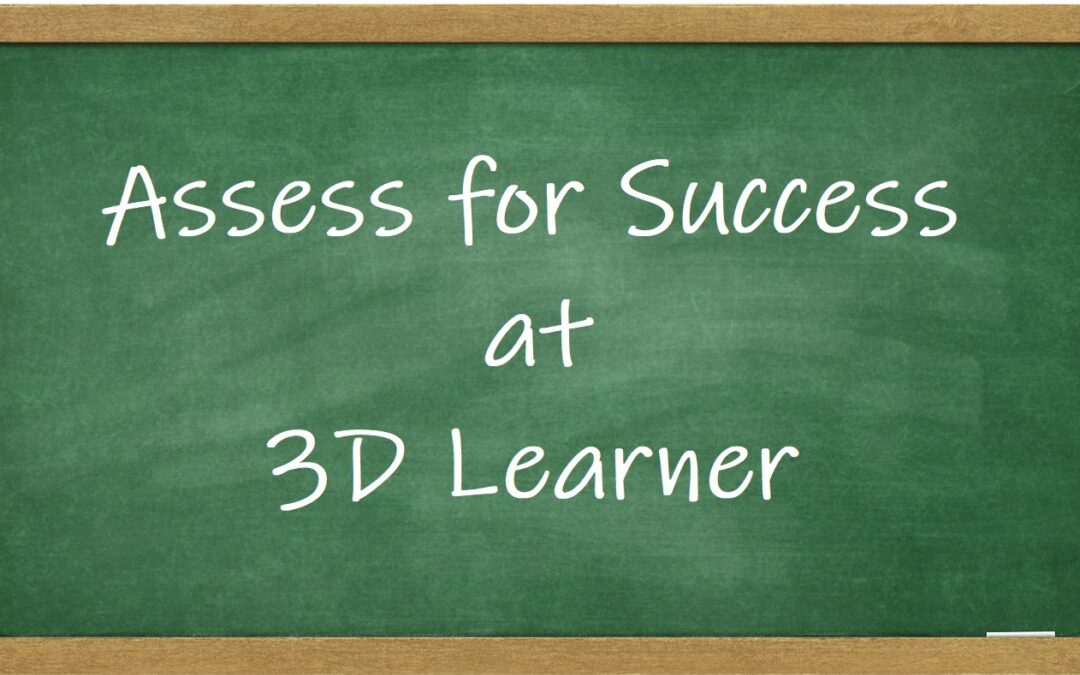
Students today are often struggling with reading fluency, reading comprehension and/or math.
Three of the greatest educational risks are:
- Parents often do not know what their child’s present level of reading fluency, reading comprehension and math skills are at
- Students who learn differently (i.e. neurodivergent, right brain and kinesthetic learners) often fall behind — as neither school based or home school curriculum may be consistent with how they learn best
- Without testing, parents may not be aware of how their child learns best, where their child is strong and where their child struggles
The opportunities for parents include:
- There are real benefits with an assessment that shows you::
- How your child learns best
- What are your child’s strengths and challenges
- What is your child’s present level of performance for reading fluency, reading comprehension and math
- If needed, the assessment can help educators to tailor a program to:
- Capitalize on how your child learns best
- Improve their reading speed, reading comprehension and math skills
- Help you to be the coach your child needs
- How you can help your child be all they can be
How 3D Learner Assesses for Success
Mary called and was not sure about her child’s reading fluency, reading comprehension and math skills were at. She had tried two years of dyslexia treatments. Mary was not interested in labeling, but she was very interested in knowing:
- How her daughter learned best
- What her daughter’s strengths and challenges were
- What was her child’s present level of reading comprehension, reading fluency and math
- If there were significant gaps, could we help her daughter get to grade level or above
- Whether what we offered could improve her child’s baseball and soccer skills. Mary knew that her daughter would be even more interested in help, if it could make her better at baseball or soccer.
Mary shared a few of her frustrations, that included, her daughter:
- Understood stories when Mary read them to her, but struggled with silent reading comprehension
- Read more fluently, but often had difficulty remembering words she had seen and not mastered
- Was good at math, but was now struggling with math word problems.
We then asked Mary what her daughter was good at, Mary shared that her daughter:
- Had an excellent memory for things she had seen and experienced
- Was a good person — who loved playing with younger kids and cared about seniors
- Was good at baseball and soccer but was inconsistent. Three area of concern were:
- Her daughter would sometimes lose focus during a game
- In baseball, she would sometimes hit the ball well, but too often she would pull the ball foul
- In soccer, her shots often went to the right side of the goalie
- Her daughter was frustrated that she was not doing as well as she wanted to
We shared this infographic with Mary and explained how we assess for how the student learns best and whether they have a visual processing, executive function, dyslexia and/or anxiety challenge.
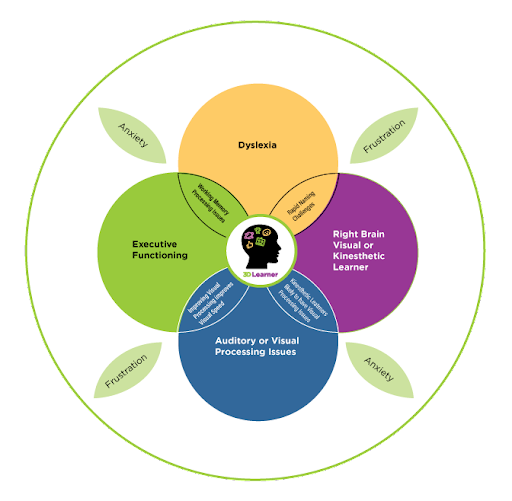
- Many smart struggling kids learn differently. They are often a neurodivergent, right brain or kinesthetic learner, who learn best when they see and experience information. This is important to know, because if they learn differently, it alters the way you teach them, the curriculum you may choose, how you parents them and how one coaches them in sports.
- 74% of the students we see have a visual processing issue – they may see the whole field or the whole room, but their eyes have difficulty converging. This often results in their skipping words and/or liens when reading and having difficulty catching a ball.
- The executive function challenges we often see may include:
- Difficulty sustaining attention and either being hyperactive or impulsive. When we assess a student with the Interactive Metronome ®, we often see that a student’s body moves faster than their brain. In sports, this results in hitting the ball too early. In baseball that would explain pulling it foul or for a right footed kicker, hitting the soccer ball to the right of the goalie. In life, the attention issues may results in a child losing focus when doing work or during a game
- The working memory assessment often shows a student has an excellent visual memory, but has difficulty remembering what they have heard or read
- The Dyslexia Assessment shows where a child is strong and where they struggle. We can assess for Dyslexia and we can also tailor a program that focuses on the key issues
- The reading comprehension assessment shows two different challenges:
- A number of students are below grade level
- Some students are at grade level, but the assessment shows they should and could be well above grade level
- Our math assessment shows us where a student is at and where they struggle
- The anxiety assessment often shows the student gets very anxious in certain situations
Mary asked about the tools we use and whether it is different from what schools and psychologists assess for. We shared that:
- The key assessment tool we use is the Structure of Intellect Assessment ® that shows how a student learns best, where they are strong and where they struggle.
Comments from a principal, a special educator and a psychologist
- A principal asked a special educator why their public school stopped using this assessment. The special educator said “We are required to find a disability in order to provide services. This assessment does not do that. 3D Learner has the luxury of focusing on tailoring a program to help a student succeed
- A psychologist commented, “I wish we could shift our focus from labeling to how to help a child succeed”
- The Visagraph ® we use to show if there is an eye tracking issue can show both the initial challenge and can be used post training to show the results Here is a video that shows a student’s eye tracking before and after training. He commented,. “I now enjoy reading and do much more of it”
- We use the Mindprint Assessment ® developed by by the University of Pennsylvania to assess executive function skills
- We use a Woodcock Johnson ® Reading Comprehensive Assessment
- We use the Core Dyslexia Assessment ® developed by the University of Florida to assess phonics, phonemic awareness and reading fluency. It also helps us to see if the child has dyslexia,
- We use the Perceptions Math Assessment ®
- We use Heartmath ® to assess for anxiety
When we assessed Mary’s daughter we did find that:
- She was a neurodivergent, right brain or kinesthetic learner who learns best when she sees and experiences information
- Her daughter had a number of skills that were well above grade level, but struggled with a few key skills
- She did have a significant visual processing issue
- Attention was an issue and her daughter’s body was racing faster than her mind This explained some of the self-control and sports related issues
- Her visual memory was excellent, but her auditory memory was weak
- She no longer has significant issues related to reading fluency, but there were some areas where she could benefit from additional training
- Her reading comprehension was a year below grade level
- Arithmetic was not an issue, but that word problems were
- Anxiety was an issue
Mary has the flexibility to prioritize training and her daughter was able to make significant gains over the next six months in reading comprehension, math, attention, visual processing, and self-esteem. Her baseball and soccer skills improved too. Mary commented that knowing my daughter was a neurodivergent learner with visual processing and executive function challenges changed everything, and addressing the whole child changed her life. She also added that by helping to improve my daughter’s baseball and soccer skills, you engaged her in the process.
If you would like to discuss your child’s situation and learn more about how we Assess for Success, you can call us at 561-361-7495 or click here to schedule an Assess for Success Conversation. Note, these assessments can be done in person or via zoom.

(call us at 561-361-7495 and ask about our assessment special)
(Especially for right brain, kinesthetic and neurodivergent learners)
How to improve reading fluency and reading comprehension is a goal for many students who qualify for the Florida Empowerment Scholarship and the Personalized Education Program.
The term dyslexia has attracted a great deal of information. Many parents invest in a dyslexia treatment. Frequently this will improve a child’s reading fluency (i.e. how fluently a child reads out loud), but reading comprehension challenge persists. At 3D Learner, we focus on how to improve reading fluency and reading comprehension with an integrated, engaging and effective program. We also address executive function, visual processing and anxiety challenges.
3D Learner offers a focused assessment that can be done in person or online, that addresses the following questions:
- Whether your child is a right brain, kinesthetic or neurodivergent learner. For the child who learns differently, it really helps to know that and to find a program that leverages their strengths, identifies and addresses their challenges and helps your child to improve both their reading fluency and reading comprehension.
- Whether your child has dyslexia — and where their reading fluency is strong and where they struggle.
- What your child’s present level of reading comprehension is
- Whether your child has a visual processing challenge — over 74% of the students we see either skip words and/or lines when reading
- How to improve your child’s reading fluency and reading comprehension
To discuss how to improve your child’s reading fluency and reading comprehension call us at 561-361-7495 to discuss your specific situation.
3D Learner — Offering a Strength Based Program to Improve Reading Fluency and Reading Comprehension for over 26 years
Since 1997, 3D Learner has been helping students to improve their reading fluency and reading comprehension. With what has become known as the Florida Empowerment Scholarship for Unique Abilities and the Personalized Education Program for others, we have been able to help more students with Florida’s vastly expanded voucher program.
3D Learner specializes in helping the right brain, kinesthetic or neurodivergent learners who often:
- Remembers details from places visited, even from years ago
- Learns best when they see and experience information
- Are a lot smarter than present results would indicate
- Often have two, three, four of the following challenges:
- They skip words and lines when reading
- They can focus on that which interests them, but lose focus when the work is hard or frustrating
- They have difficulty remembering what they heard or read
- Anxiety and frustration often occur when doing academic work
For voucher students, we are offering a two-hour assessment – tutoring – feedback session when you purchase one hour from 3D Learner through the Florida Empowerment Scholarship or the Personalized Education Program. You can either:
- Purchase an hour and call us at 561-361-7495 or
- Call us at 561-361-7495 to discuss your specific situation.
3D Learner Results for Right Brain, Kinesthetic and Neurodivergent Students
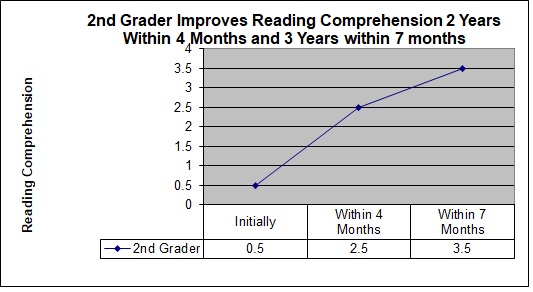
We have helped a second grader to improve her reading comprehension 3 grade levels in 7 months
and a 9th grader to improve her reding comprehension 4 grade levels in 6 months.
A homeschool student had been through 2 years of dyslexia treatments, but her comprehension was still at the kindergarten level, even though she was in 2nd grade.
With our help, she was able to:
- Significantly improve her reading fluency
- Improve her reading comprehension by 2 grade levels in 4 months and by 3 grade levels in 7 months
- Significantly improve her attention, visual processing, and confidence
- Read 23-chapter books on her own, after not having read one previously
- Go from a struggling dancer to the top group, because of their improved neural timing, working memory and confidence
A 9th grader improved her reading comprehension by 4 grade levels in 6 months.
Her mother commented: “Her reading comprehension has increased four grade levels, and she has increased her rate of reading by 100 words per minute. Her ability to comprehend what she is reading has also improved and she doesn’t hate reading for the first time in her life”.
For voucher students, we are offering the assessment – tutoring session with a separate parent consult, if you purchase one hour from 3D Learner through the Florida Empowerment Scholarship or the Personalized Education Program. You can either:
-
Purchase an hour and call us at 561-361-7495 or
-
Call us at 561-361-7495 to discuss how to improve your child’s reading fluency and reading comprehension and more.
For non-voucher students, we are offering this $250 value for $124.

The neurodivergent, right brain or kinesthetic learner in 4th, 5th and 6th grades missed critical time in school during the pandemic. They often struggle with reading fluency, reading comprehension, math word problems, processing issues and may struggle with anxiety and frustration.
This blog post focuses on the significant risks and opportunities for smart kids who learn differently, the key strengths and challenges of the neurodivergent, right brain or kinesthetic learner, examples of our successes and the pivotal role parents play.
If you would like to discuss how to help your child succeed, you can either
call us at 561-361-7495 or schedule a call at “Let’s Discuss How to Help Your Child Succeed”
9 key points we wish to stress are:
- Many smart struggling students are neurodivergent, right brain or kinesthetic learners. These are the kids who learn best when they see and experience information. They are often a lot smarter than present results would indicate. They often have a sea of strengths and challenges. Most school based and outside interventions fail to recognize and capitalize on these strengths and the need to engage the student in the learning process. You can access our no cost screening tool at
Is My Child a Neurodivergent, Right Brain or Kinesthetic Learner?
- There is a significant risk that things will get worse.
- These students can do far better with an integrated, engaging and effective system that significantly improves reading fluency, reading comprehension, math skills, attention, executive function skills, and confidence, while reducing anxiety. We have found it important to:
- Tailor solutions to meet the student’s needs
- Leverage their strengths and engage them in the learning process
- Identify and addresses their challenges
- Lower their anxiety and boost their self-esteem
- Helps parents to secure the help the schools can provide
- Helps the parents to be more effective coaches and advocates for their child
- Psycho-educational testing by itself is valuable, but the benefits are much greater when it leads to a transformational program that allows your child to make significant progress.
- For those students with dyslexia, a dyslexia treatment is often recommended. The Science of Reading, that focuses on improving reading fluency, may be an integral part of the solution, but most of these programs are not designed to improve:
- Vocabulary and reading comprehension
- Math and writing skills
- Attention, working memory and processing speed — executive function skills
- Your parenting skills
At 3D Learner, we address dyslexia and reading fluency issues with the UFLI Program ®, a dyslexia intervention developed by the University of Florida Learning Institute. It is an excellent option, that allows us to tailor a solution to meet your child’s specific needs.
- For those students with ADHD, Attention Deficit Disorder, ADHD medication is often recommended. We use the Interactive Metronome ® to improve attention. This can either be used to complement medication or as a stand alone offering. Our students have done very well with the Interactive Metronome, that has several unique benefits:
- It builds neural connections in the brain, that are still there years later.
- It works all day, so you do not have the problem of your child having difficulty paying attention when doing homework, because the medication has worn off.
- It also improves handwriting, reading and math fluency, sports skills and impulse control.
Note, the Interactive Metronome produces very different results, depending on the provider. We have used it for over 24 years with excellent results.
- If your child is a neurodivergent, right brain or kinesthetic learner, it is up to you to find the solution that can help your child be all they can be.
- 3D Learner has helped thousands of neurodivergent, right brain and kinesthetic learners to make significant gains in months.
If you would like to discuss how to help your child succeed, you can either
call us at 561-361-7495 or schedule a call at “Let’s Discuss How to Help Your Child Succeed”
One mom commented, “How is it you know my child better after less than 10 minutes than people who have taught him for years?. Our response, “That is our focus, helping kids who learn differently succeed.”
Her son gained 3 years in his reading comprehension is less than a year. His teacher said, “Tyler made more progress in a year than any child I have had in 27 years of teaching”.
Specific challenges may include some of the following
- Reading fluency and reading comprehension. Reading comprehension gaps often widen and start to impact math, social studies and science,
- Writing. Handwriting may be an issue, but putting their thoughts on paper is almost always an issue
- Math. Some are good at arithmetic, but math word problems are often a nightmare
- Processing skills. They often have an excellent memory for what they have seen and experienced, but have great difficulty remembering what they heard or read
- Attention. They can often hyper-focus on video games or something they like, but they often have great difficulty paying attention to that which is boring or frustrating
- Visual processing. The neurodivergent, right brain or kinesthetic learner often has good peripheral vision, that is seeing the world around them. Their challenges often include skipping words and lines when reading, missing signs when doing math problems and with handwriting and misaligning their math work, that results in mistakes
- Anxiety, frustration and lack of confidence. These have always been a problem for many kids, but these issues are more common and more significant with this group in this post pandemic era.
- In some cases, being rebellious. These students often are in fight or flight mode and sometimes the relationship with their parents are really strained.
There is a risk that academic, frustration and anxiety issues will worsen, as the work gets harder and hormones kick in.
As parents, there are several key points to recognize:
- School programs and accommodations can help, but they rarely help a neurodivergent, right brain or kinesthetic learner come near their potential
- If your child learns differently, they may have the potential to do far better within months
- If you would like to discuss how to help your child succeed, you can either
call us at 561-361-7495 or schedule a call at “Let’s Discuss How to Help Your Child Succeed”
The Rebellious Baseball Player who was a Neurodivergent Learner
Alan seemed like a normal kid, until you realize that he had been suspended twice by his school. His parents complained that he did not read much, he was at times confrontational and even though he liked baseball and was good at it, he often had games where he was off.
They were also upset that despite an above average IQ, he was now in classes with a lot of kids who were struggling academically and were not a good influence on Alan. A therapist referred the parents to 3D Learner.
The parents were aware of the emotional control issues. They were not aware of how far behind their son was, that it could get worse and that there was a significant opportunity for growth.
Alan was not interested in school, but his ears perked up when we told him we could improve his baseball skills. His assessment showed:
- His reading comprehension was four years below grade level
- He had difficulty paying attention, but the real issue was his impulsive behavior. When he tried to match a beat and he was off, he got frustrated and at times angry. He shared that this anger and impulsivity happened in a number of settings – including the two where he was suspended
- He skipped words and lines when reading and read very slowly
- He learned best when he saw and experienced information
The goals we all agreed to where to:
- Improve his reading comprehension 3 grade levels in 6 months
- Behave well in school, even when he was frustrated
- Get out of remedial reading for 7th grade and to be in classes with his friends
- Increase his reading speed from 110 to 200 words per minute
- Increase his batting average from 263 to 350
- Increase the number of home runs from 1 to 5
- Work respectfully with his parents and to have a nonverbal cue, when he felt himself losing it
The actual results were:
- He improved his reading comprehension 4 grade levels in 4 months
- His behavior was far better at home and in school
- He improved his reading speed to 206 words per minute
- He did get into regular English classes and got a B in English
- His batting average improved from 263 to 403, which was the highest on his team
- He hit 10 home runs that spring and it led the league
A few of the keys to his success:
- His parents saw the potential, were committed to his success and really liked that we could improve his academic, his behavior and his baseball skills. We are always looking for a hook to engage students.
- We taught him how to pause when he was frustrated
- Our hands-on program engaged him and he learned how to visualize what he read
- We improved his attention using the Interactive Metronome ® and showed him how to stay calm, even when he made mistakes
- We improved his visual tracking
- He saw changes within weeks in his reading, his behavior and his baseball performance
The More Typical Neurodivergent, Right Brain or Kinesthetic Learner
Ben could put together Legos for hours, had an incredible visual memory, but in 5th grade, his comprehension was two years below grade level, he often lost focus and he avoided reading. Note, if you only read at 110 words per minute, you might avoid reading too. Ben also suffered from anxiety challenges.
His parents saw an article with this graph that showed that secondary school students with learning disabilities often fall 3 to 4.9 years below grade level and some fall even further behind.
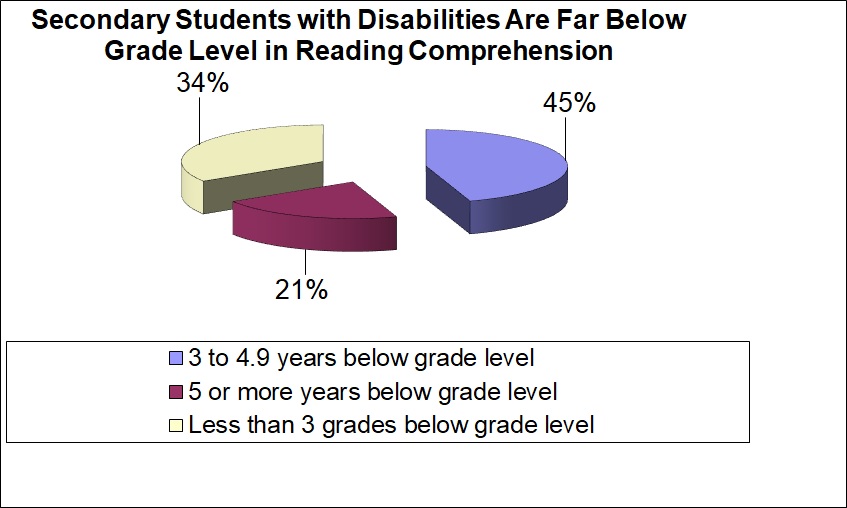
We assessed Ben and it confirmed:
- A significant anxiety challenge — his heart rate jumped to 142 beats per minute when we just mentioned taking an English Language Assessment
- He did lose focus
- His reading comprehension was two years below grade level
- He clearly learned differently and was a neurodivergent learner and very creative.
- He was motivated to succeed
The goals we set were to:
- Improve his comprehension 3 grade levels in 6 months
- Decrease the time it took to get homework time from 2.5 to 1.5 hours
- Have him stay calm
The results with Ben were good:
He improved his reading comprehension 3 grade levels in 4 months.
- He decreased his homework time to 1.25 hours
- He was much calmer
Even better, Ben wound up reading 4 long books over the next 3 months and went on to win an award as the best reader in his middle school.
Smart Neurodivergent Students
Alexa’s mom was really frustrated. Alexa had a 118 IQ, well above average. Alexa’s reading was at the 48th percentile and she was very shy and afraid to ask questions.
Mom had asked the principal what she could do, and the principal suggested there was no need to do anything, he then added, “Someone has to be average”.
Mom became a Mom on a Mission.
She heard us speak on GOLD Students — Gifted Operating with a Learning Difference. We focus on the student’s gifts and when we do, many neurodivergent, right brain and kinesthetic learners do far better.
Our assessment confirmed that Alexa both learned differently and was on grade level for reading comprehension. It also showed she lost focus and skipped words and lines when reading.
The goals were to:
- Significantly improve her attention and visual processing
- Get Alexa to ask 3 questions a day the first month, 4 a day the second month and 5 a day the third month
- To improve her performance on the SAT from the 48th to the 85th percentile
The results were Alexa:
- Made significant improvements in her attention and visual processing
- Asked 4 questions a day the first month, 8 questions a day the second month and we stopped counting
- Improved her reading comprehension from the 48th to the 95th percentile
- Became an extrovert and was a leader in the band in high school
7 Important Things to Consider About a Neurodivergent, Right Brain or Kinesthetic Learner in this Post Pandemic Period
- Too often the neurodivergent, right brain or kinesthetic learner’s strengths and either not identified or the solutions do not capitalize on their strengths
- Capitalizing on their strengths is often a key to improving their attitude and lowering their anxiety
- The learning gaps are more significant than ever, the gaps often widen and schools rarely close the gap
- Reading fluency and reading comprehension may both often issues and you want to address
- Executive function challenges (i.e. attention, working memory and processing speed) need to be both identified and improved
- Visual processing is often an issue
- It takes informed, empowered and proactive parents to make the difference
If you would like to discuss how to help your child succeed, you can either
call us at 561-361-7495 or schedule a call at “Let’s Discuss How to Help Your Child Succeed”
Note, it is often up to parents to put their neurodivergent, right brain or kinesthetic learner on their Pathway from Stress to Outrageous Success


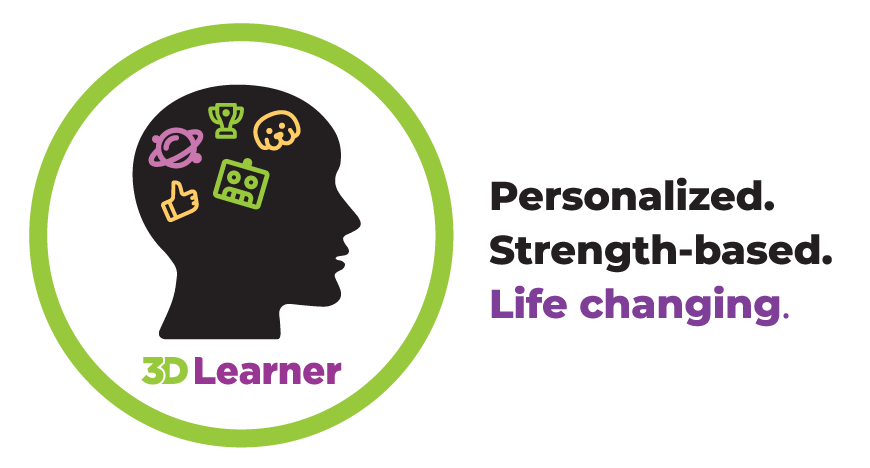
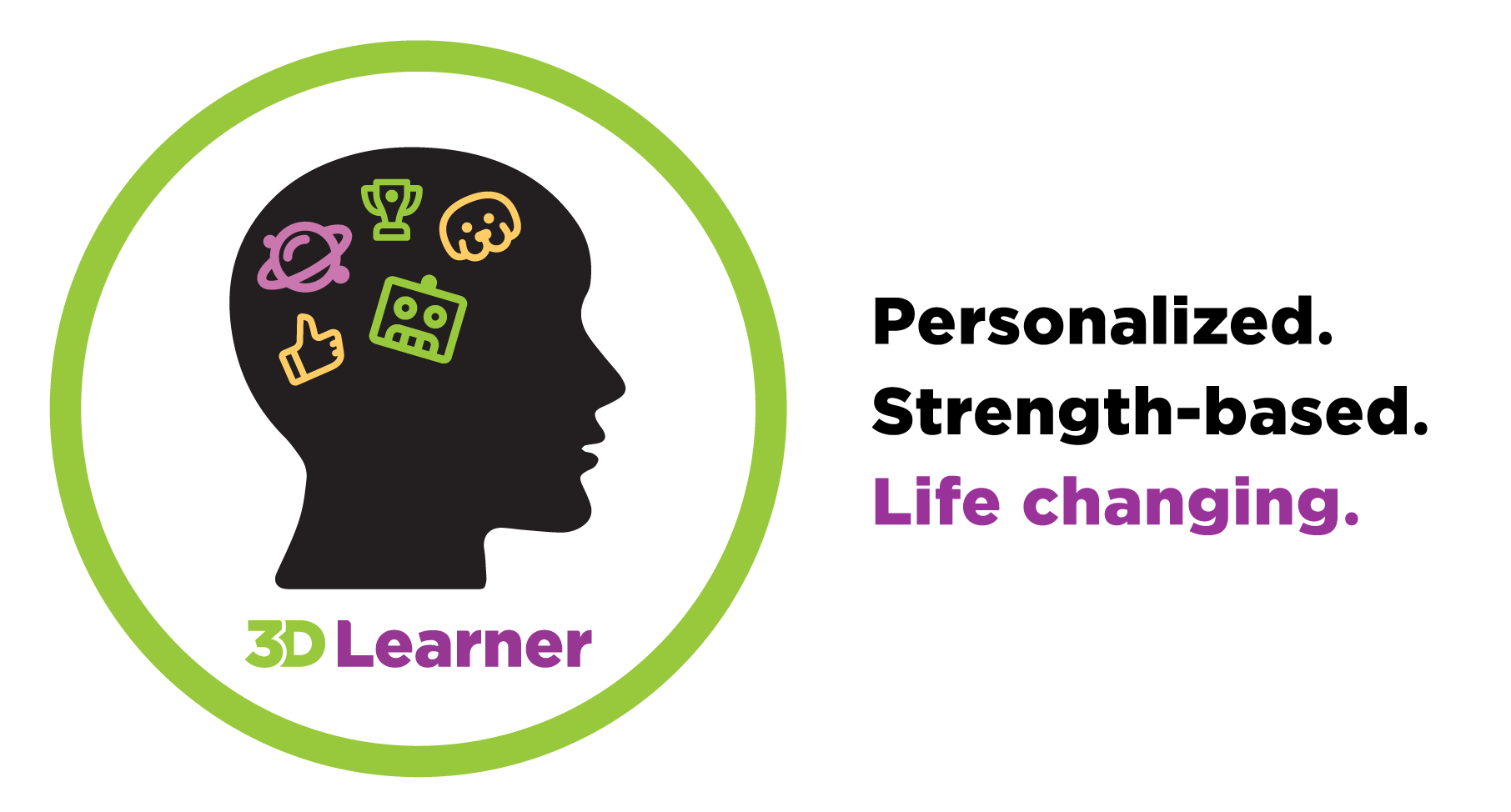








Recent Comments